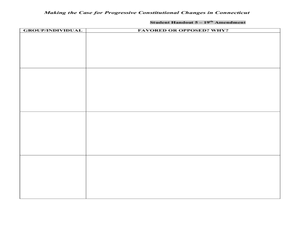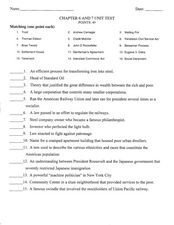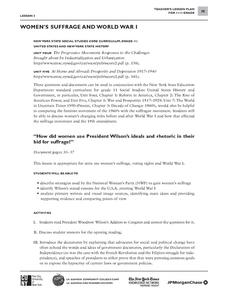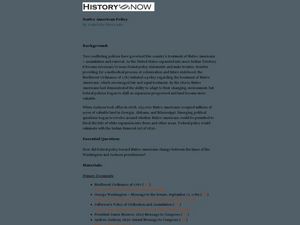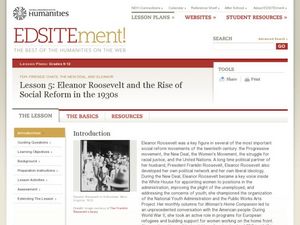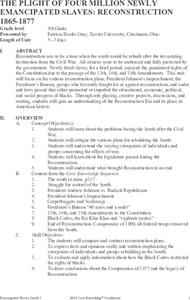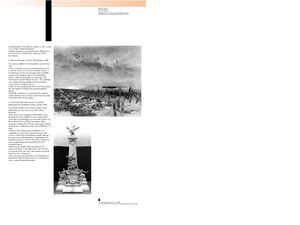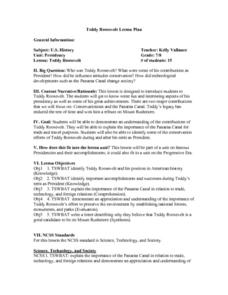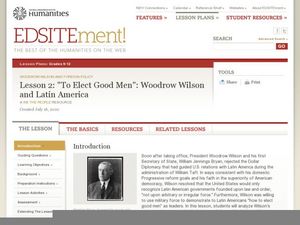Curated OER
The Gilded Age & the Progressive Era (1877–1917)
In this online interactive philosophy worksheet, students respond to 7 short answer and essay questions about the Gilded Age and Progressive Era in the United States. Students may check some of their answers...
National First Ladies' Library
Women's Lives in the Victorian Era
The lives of middle-class Victorian women were circumscribed by strict standards that governed all aspects of behavior. To gain a better understanding of the Victorian Ideals for women, class members research the life of a middle-class...
Curated OER
The Progressives
In this Progressive Era worksheet, students review a chapter as they read 10 descriptions identifying who or what is speaking, respond to 4 short answer questions, and explain a historical theme regarding this time period in United...
Curated OER
Understanding The Progressives And Their Viewpoints
Eleventh graders explore the Progressive Era in American history (1900-1917). They use the internet and other sources to research the Progressive Movement, identify three Progressive presidents, and explore considered reforms. Students...
City University of New York
Women's Suffrage and World War I
Democracy cannot exist where not everyone has equal rights. Discuss the state of democracy and women's suffrage during World War I with class discussions, debates, and primary source analysis, in order for class members to connect...
Curated OER
Review of our Presidents from the Progressive Era to Cold War
Covering the main events of the Cold War, this (mistitled) presentation includes photographs, political cartoons, and amusing graphics to illustrate its points. The information on the slides is helpful for an overview of the Cold War,...
Middle Tennessee State University
Who's Afraid of the Big Bad Wolf? A Comparison in American Culture
As part of their study of the Progressive Era, class groups examine a 20th century version of "The Three Little Pigs" through a New Era lens and identify how ideals such as the value of hard work, creativity, and problem solving,...
Bill of Rights Institute
Progressivism and The New Deal
Bust those trusts! Scholars investigate the Progressive Era leading to the New Deal in America. They examine the impact legislation had on attempting to control big business in the United States. Are there any parallels to today?
Curated OER
Making the Case for Progressive Constitutional Changes in Connecticut
Students take a closer look at Constitutional Amendments. In this Progressive Era instructional activity, students discover how the amendment process works and then examine 4 amendments proposed during the era in Connecticut. Students...
Curated OER
Chapter 6 and 7 Unit Test
In this Progressive Era and Big Business test worksheet, students respond to 15 matching, 3 multiple choice, and 4 short answer questions.
City University of New York
Woman's Suffrage and World War I
How did women use President Wilson's ideals and rhetoric in their bid for suffrage? To answer this essential question, class groups analyze primary written documents and visual images.
Curated OER
A Conservative Era
In this Conservative Era worksheet, students write definitions for six terms, examine five pairs of sentences then determine which one is false, then link two sets of words together by identifying which historical theme they share in...
Curated OER
Presidents: Past and Present
Students identify George Washington and the current president and distinguish between past and present events. They listen to a text about Washington and make predictions. They generate a list of synonyms for past and present and...
Facing History and Ourselves
Choosing to Participate Posters
"A poster exhibit to encourage dialogue, engagement, respect, and participation in our communities..." This is a set of attractive posters that reference influential historical figures, such as George Washington and Albert Einstein, and...
National Endowment for the Humanities
Upton Sinclair, Theodore Roosevelt, and Harvey W. Wiley
Though Upton Sinclair's novel The Jungle shocked the American public into a thorough examination of the meat-packing industry, the author was disappointed that his book's main argument—the exploitation of American immigrants—was not...
Curated OER
Native American Policy
Students examine federal policies regarding Native Americans. In this Native American assimilation and removal policies lesson, students conduct research to compare the changes in federal policy regarding Native Americans between the...
National Endowment for the Humanities
Eleanor Roosevelt and the Rise of Social Reform in the 1930's
Eleventh graders explore the various roles that Eleanor Roosevelt took on. In this US History lesson, 11th graders analyze the views that Eleanor Roosevelt held as an advocate for social justice. Students evaluate her contributions to...
Smithsonian Institution
Mobilizing Children
Scholars find out how the government used propaganda to mobilize children to help in the war effort. Lesson exercises include analyzing a quote from Franklin Roosevelt, viewing propaganda images and posters, and participating in a lively...
Curated OER
Is All Well in Welfare?
Students explore current welfare reform issues and create plans of action to improve welfare reform laws in the United States. They predict what President Bush's "Working Towards Independence" welfare reform program might entail and...
Curated OER
The Plight of Four Million Newly Emancipated Slaves: Reconstruction - 1865-1877
Students study the Reconstruction Era after the US Civil War. In this Reconstruction lesson set, students examine the problems that were encountered by the South after the Civil War, look at different plans for Reconstruction, and...
Curated OER
The Republic and Its Images
Students study the meaning of The Republic and the symbols of the Republic. They learn definitions and look at images that are meant to be a lesson plan that comes before a museum visit. They look at images of artwork from this era of...
Curated OER
Teddy Roosevelt
Learners examine the life, contributions, and influence of Teddy Roosevelt. They view a slideshow lecture and take notes on a handout, filling in the blanks on the handout. Students then write a persuasive letter to a governmental...
Curated OER
Lesson 2: "To Elect Good Men": Woodrow Wilson and Latin America
Students analyze Woodrow Wilson's foreign policy. In this foreign policy lesson, students examine how the Wilson administration responded to civil unrest in Latin America.
National Endowment for the Humanities
“Read All About It”: Primary Source Reading in “Chronicling America”
Can investigative journalism become too sensationalistic and accusatory, or is it vital for the survival of a democracy? Middle schoolers analyze primary source documents from early 20th-century newspapers as well as Theodore...










